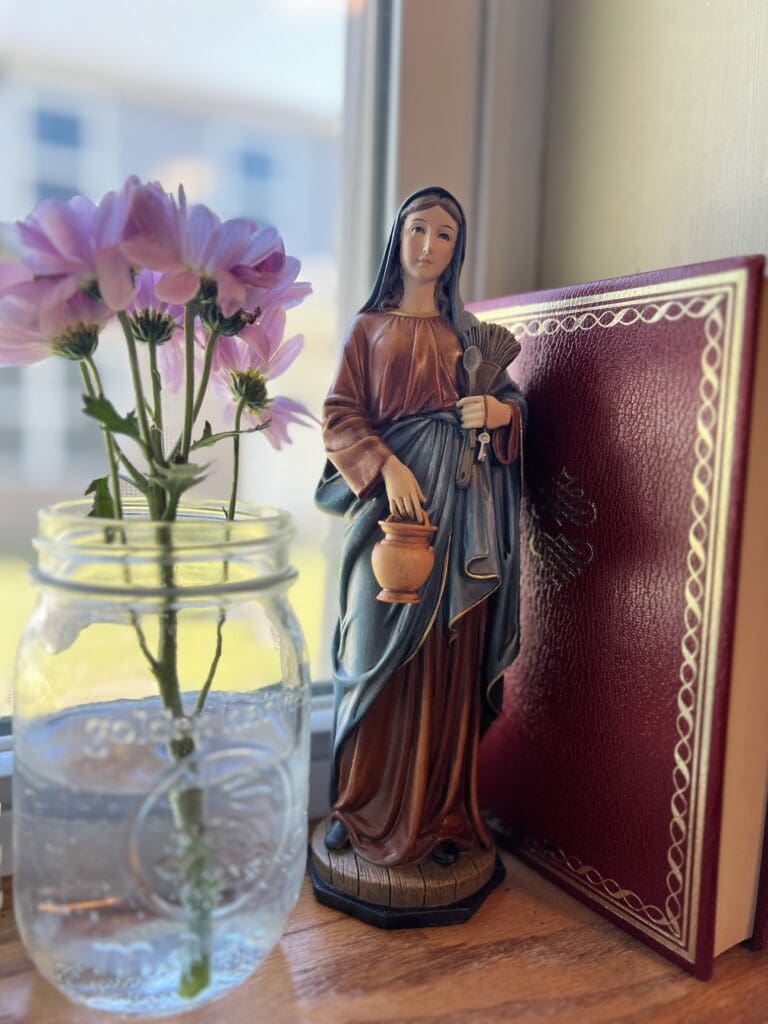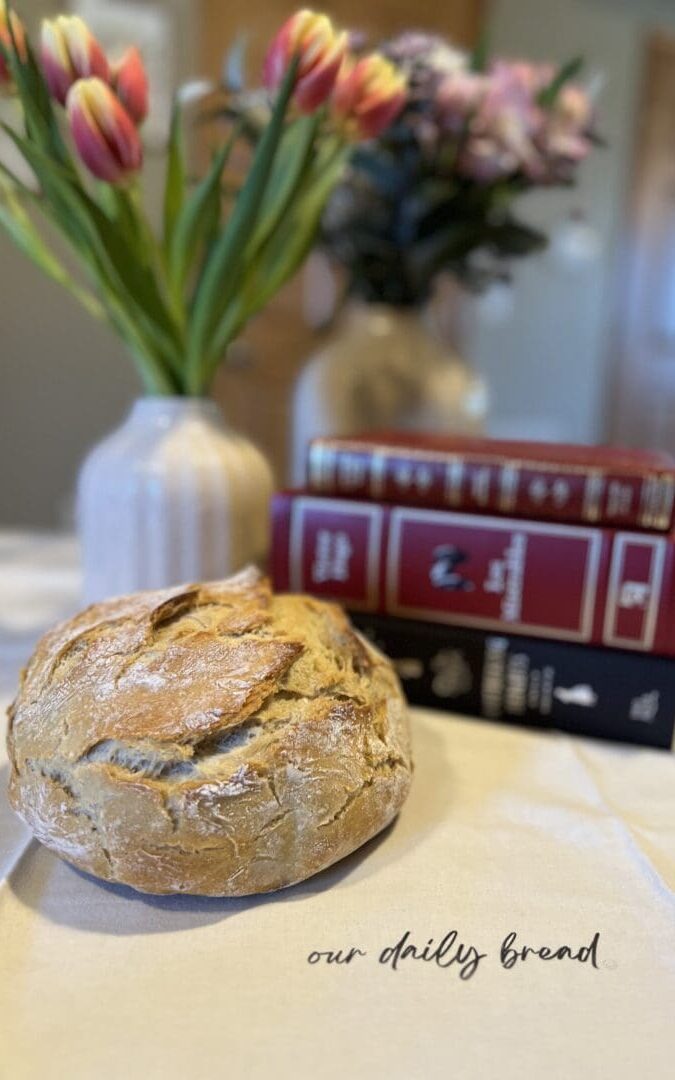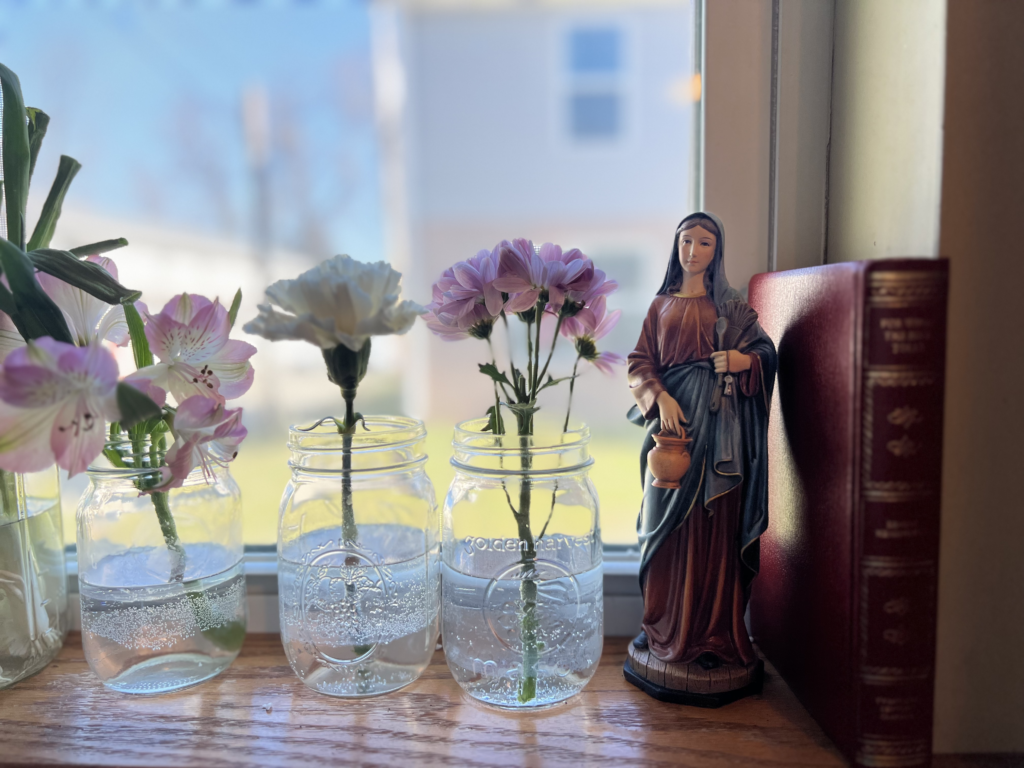The Hiding Place: “The Ripple of Laughter” in the Darkness
A new reflection on our Lenten read from Well-Read Mom Year of the Sister
Written by Megan Keyser
My eldest daughter has long been sensitive to frightening films or alarming accounts in books, particularly when the subject revolves around historical events. Unsurprisingly, as I began to read Corrie ten Boom’s The Hiding Place aloud to my four oldest children, I witnessed Natalie visibly tense each time I opened the book—waiting for the impending doom to descend upon Corrie, her family, and her loved ones. Though we read several chapters together, our unpredictable home life required me to continue reading alone to finish the book for discussion. When I declared I had finished, Natalie immediately looked up and asked: “Was it scary?” I paused for a moment, considering the horrors detailed in the biography’s final chapters—the brutality of unbridled hatred, the betrayal of friends, neighbors, and countrymen, the bestial conditions of the prisons and the concentration camp, the blackness of sin—before I replied with a joyful smile: “No. In fact, it was incredibly hopeful.”
Just how does a novel revolving around the injustices of Nazi Germany succeed in becoming a source of inspiration and hope? How does an individual exude optimism when families are cavalierly torn asunder and malnourished women and children are living in flea-infested prison barracks? How do people find hope in the face of flagrant cruelty or disdain? The answer, as the ten Booms poignantly and concretely discovered, is found in the One Who endured the greatest suffering of all, teaching us not only that sacrifice is love itself but also that suffering, hardship, and service borne out of devotion is the mirror by which we reflect His Holy Light.

While witnessing inexplicable hopefulness amid Ravensbruck’s squalor, viciousness, and inhumanity, Corrie recalled Romans 8: 35-37: “Who shall separate us from the love of Christ? Shall tribulation, or distress, or persecution, or famine, or nakedness, or peril, or sword?… Nay, in all things we are more than conquerors through Him that loved us” (206). And she further reflected that, somehow, “the blacker the night around us grew, the brighter and truer and more beautiful burned the word of God,” transforming what should have been a source of despair and utter misery into a miraculous joy: “Life in Ravensbruck took place on two separate levels, mutually impossible. One, the observable, external life, grew every day more horrible. The other, the life we lived with God, grew daily better, truth upon truth, glory upon glory” (206).
In the context of my own motherhood, I often marvel at the amazing growth in my willingness to sacrificial surrender—a supernatural development beyond my natural and instinctive capabilities. While I am far from spiritual perfection, it is comforting to know that “disasters” and difficulties, which would have formerly, as a new mother, sent me into a tailspin of frustration, anger, and self-doubt, are now, unbelievably, not only much easier to bear, but also almost not even worth noting.
I can only attribute this miraculous occurrence within my soul to the work of the Holy Spirit, taking my weaknesses and sinful tendencies and lovingly transforming them into a source of strength. Through the sacrificial cross of motherhood and our humble willingness to submit to the needs of others, Christ enables mothers to be “more than conquerors.” Like Esther of old, we may question how we can manage the crosses in our path or even openly doubt our survival on any given day, but “perhaps [we] were born for a time [and a vocation] such as this” (Esther 4:14).
In this secular age, human purpose is often reduced to the here-and-now, the convenient, the transient. If this world is our end, what is the significance of suffering? What can sacrifice possibly merit us, except for limiting our earthly experience and lessening our happiness? As Christians seeking to navigate this world without succumbing to its self-centered temptations, we (despite our best intentions) all too frequently and regrettably find ourselves pursuing pleasurable paths that insulate us from difficulty, toil, sorrow, and heartache. Instead of taking up our cross to imitate our humble Master, we recoil from suffering, not recognizing the glory beneath the forbidding surface.
Ironically, while we personally tend to shun those crosses sent to increase our capacity for charity and courage, we continue to marvel at heroic examples of immense and seemingly impossible virtue. Hence, the power of the testimony in The Hiding Place. It recalls to our mind the Biblical Truth that, no matter the difficulty, no matter the struggle, we can truly do “all things through Christ who strengthens us” (Philippians 4:13).
But the question remains: how does one accomplish feats of such incredible virtue and awe-inspiring generosity? How does one become a saint—particularly in a godless society? With moving witness, the ten Boom family offers clear and poignant insight outlining the path forward: a spiritual strength centered on the importance of continual prayer and familial devotion, joyful gratitude, profound humility, and immense compassion toward all—even our cruelest enemies.
For the ten Boom family, prayer and devotion to God is the heartbeat of family life. Its presence is no less expected than meals, laundry, and business affairs. The force directs their existence and sustains them through all life’s trials, great and small, from sickness and death to thwarted love and household concerns. It is that basis of prayer that later anchors Corrie during trials almost too gruesome to contemplate.
“I can do all things through Christ who strengthens me.“
Philippians 4:13
When first arrested by the Gestapo, Casper ten Boom gathers a group of prisoners around him for prayer. Corrie reflects: “Every day of my life had ended like this: that deep steady voice, that sure and eager confiding of us all to the care of God. The Bible lay at home on its shelf, but much of it was stored in [Casper’s] heart. His blue eyes seemed to be seeing beyond the locked and crowded room, beyond Haarlem, beyond earth itself, as he quoted from memory: ‘Thou are my hiding place and my shield: I hope in thy word…Hold thou me up, and I shall be safe…’” (149).
The habit of prayer and spiritual reflection was so constant in their daily existence that it impressed upon their very souls and minds the Truth that would serve as a salve in their moments of utter tribulation. Without that lifetime of prayerful habit, would they have been equipped to face the evils with such profound strength and fidelity to Christ?

In our own “humdrum” lives as mothers, tackling the often tedious, tiresome, and thankless tasks inherent to motherhood, we are offered countless opportunities to strengthen our spirits in the virtues of patience, compassion, fortitude, and wisdom, which will not only create happier, holier households for our families to enjoy but will equip us to withstand all daunting circumstances with God’s grace. Suppose we faithfully seek to cultivate our own little domestic churches in which prayer, however imperfectly accomplished, remains essential and constant and in which relationship with God takes precedence over worldly concerns. In that case, we can trust in God lavishing us with His extraordinary strength to accomplish the seemingly impossible.
Like seasoned athletes prepared for the race, the ten Booms, fortified by their habitual and devoted prayer life, exhibited formidable and supernatural confidence in the Lord. In a place where one’s trust in God could easily—at least, from a purely human understanding—wither in the decay and depravity, their reliance on God only increased. Arriving at Ravensbruck, Corrie lamented in a moment of raw and justifiable human emotion: “Betsie, how can we live in such a place?”
However, instead of directly responding to her sister’s desperate query, Betsie utters: “Show us. Show us how.” Corrie is awestruck and considers: “It was said so matter of factly it took me a second to realize she [Betsie] was praying. More and more the distinction between prayer and the rest of her life seemed to be vanishing for Betsie.” (209) What an extraordinary blessing to turn to God with childlike confidence in His plan—however challenging it might be! God longs to hear our voices imploring Him for assistance. If we only raise our pleas in confidence, He, as the Best of Fathers, will see us through the troubles and hardships we face—transforming them into sources of His glory.
Using this springboard of prayer and knowledge of God as our catalyst, we, like the ten Booms, can cultivate deep-seated gratitude to God that would otherwise be impossible without reliance and trust upon Him: “Rejoice always, pray constantly, give thanks in all circumstances…” (209). By placing our trust in God, we, like Betsie, recognize that all things, even those most repulsive to our natural tendencies and inclinations, fulfill His Will for our earthly lives and, ultimately, our eternal welfare.

Suppose we, as mothers, transform our outlook to view all circumstances with gratitude. How might we radically change the darkened landscape of our modern society, which fiendishly portrays motherhood as an impediment to success and happiness and considers children a burden? By joyfully accepting the crosses of daily living, how can we spread peace, contentment, and charity to our family members, friends, community, Church, and beyond? How can we widen “the ripple of laughter” in the darkness? (211)
As the ten Boom family reminds us, we enable ourselves to accomplish the great things God has in store for each of us by practicing fidelity in the here-and-now, the humdrum, and the ordinary. God rewards our small inclinations toward Him by using our weakness to demonstrate His strength. In a world increasingly filled with turmoil, hostility, and inhumanity, may Christ’s light shine through us, whether through an encouraging smile, a generous hand, or a gentle word of forgiveness. As Betsie affirmed from her prison: “…What better way could there be to spend our lives?” (188)

About Megan Keyser
Originally hailing from Pittsburgh, Pennsylvania, Megan is a 2006 Hillsdale College graduate with a degree in Classical Studies. These days, Megan thrives on the challenges and joys of her role as a Catholic, stay-at-home mother, who heads a chapter of the Well-Read Mom, dabbles in social commentary and other writing pursuits, and advocates for the pro-life cause. Despite the inevitable chaos of large family life, Megan is thankful for her lively brood and relishes juggling household responsibilities, babies in diapers, and, of course, a good book. She resides in Noblesville, Indiana, with her husband, Marc, an engineer in the energy industry, and their ten children: five sons and five daughters, ages 15 years to 6 months old.
About Well-Read Mom
In Well-Read Mom, women read more and read well. Our hope is to deepen the awareness of meaning hidden in each woman’s daily life. We long to elevate the cultural conversation and revitalize reading literature from books. If you would like us to help you select worthy reading material, we invite you to join and read along. We are better together! For information on how to start or join a Well-Read Mom group visit our website wellreadmom.com

